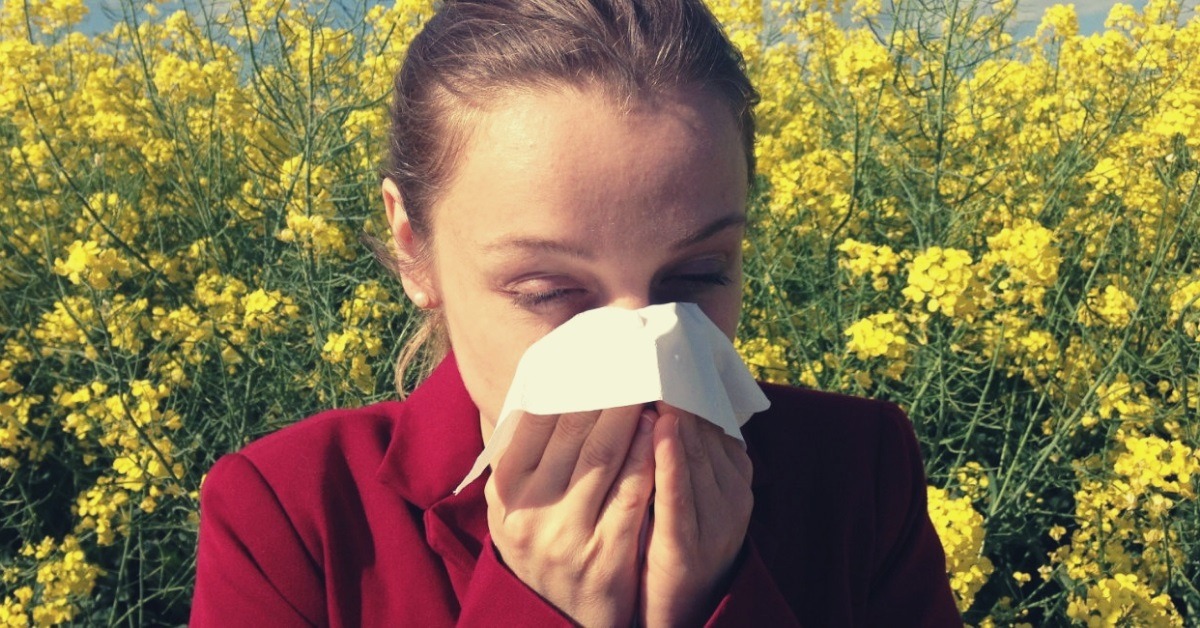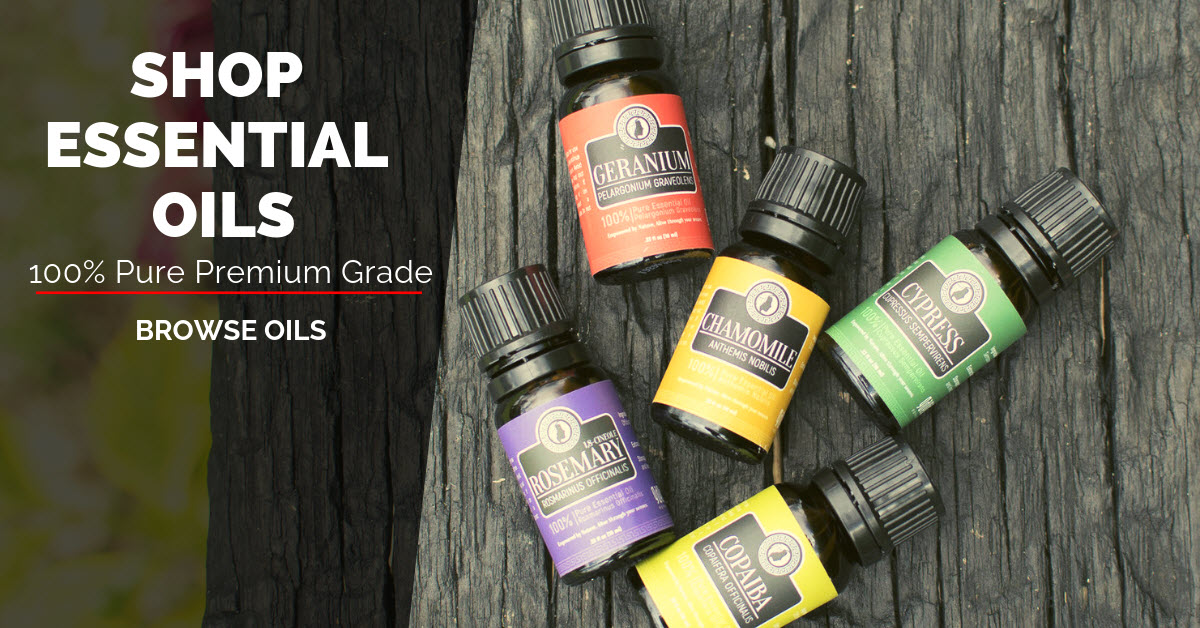Allergic reactions are encountered when your well-meaning immune system overreacts to harmless substances. A principal function of the immune system is to identify and ward off foreign objects by making antibodies. These antibodies later identify allergens as harmful, even though they aren’t. As antibodies and allergens interact, this may cause a chain of unfavorable reactions.
Allergens can include the medications you use, food, mold in the atmosphere, pet dander, pollen, insect bites and stings. The list is endless. Your body’s reaction to allergens may differ in severity and symptoms. This will hinge greatly on the allergens you were exposed to, and your body’s mechanism.
Why Essential Oils Are Good For Allergies
Administering essential oils will not prevent you from being exposed to allergens. That’s a challenging thing to do, especially when substances in the environment are the offenders. However, essential oils will do what most allergy medications do – help you deal with allergy symptoms.
An allergic reaction might manifest through runny nose and eyes, swollen lips, hives on the skin, and even diarrhea. These are what essential oils are good for. They help you deal with uncomfortable allergic reactions. In cases of severe allergic reactions, anaphylaxis, do not hesitate to see a doctor.
7 Best Essential Oils For Allergies
1. Manuka Essential Oil (Leptospermum scoparium)
This honey-like, earthy scented extract soothes allergic reactions. The natural compounds of the oil produce an effect that counters the histamine chemical created by the immune system. This in turn may help allergic reactions caused by insect stings and bites.
Use 6 drops of manuka in a 30 ml ointment base to soothe itchiness and hives resulting from insect bites. Note: If at any time your chest begins to tighten because of an allergic reaction due to an encounter with insects, contact your doctor immediately.
Best for: allergic reactions from insect stings and bites
2. Spikenard Essential Oil (Nardostachys jatamansi)
Most allergic reactions manifest on the skin. The most common form is called atopic dermatitis. This mainly occurs almost immediately after contact with the allergen. As compounds of “nard” creates an action against inflammation of the skin, the extract may be used for skin allergies.
Use spikenard to soothe itchiness, redness, and flakes on the skin by administering as a bath oil. Add 6 drops of spikenard to a bath and a tablespoon of milk as a diluent. Sit for about 10 to 15 minutes to allow the skin to assimilate the oils.
Best for: skin allergies
3. Peppermint Essential Oil (Mentha piperita)
An allergic reaction to food becomes evident through swollen lips, throat, face, tongue, and even diarrhea. Itchy eruptions may also be seen on the skin. The cooling effect of the oil may soothe skin eruptions, and the components working against inflammation may control swelling.
Use to make a cold compress by adding 6 drops of peppermint in a teaspoon of base oil to decrease swelling and inflammation in the face. This compress may also be used on skin eruptions.
Best for: Food allergies
4. Melissa Essential Oil (Melissa officinalis)
Melissa mimics an antihistaminic, which may provide relief against common symptoms of allergies. Not only does it soothe and quiet itchy skin allergies, but it may help with hay fever. Melissa creates a ‘feel-good’ vibe, and may calm anxiety associated with rapid allergic occurrences.
Use Melissa to get that calming effect by turning the heat up in a sauna. Six drops of the extract should suffice. A diluent or dispersant isn’t required – only a basin with water and the oils are needed. After assembling your hot rocks, pour the water infused with the oils over them. Sit back, relax, and enjoy the warmth while your allergy symptoms abate.
Best for: Common allergic reactions
5. Helichrysum Essential Oil (Helichrysum italicum)
Helichrysum is that wonder oil with “promising pharmacological activities”. The oil has deep traditional roots in European countries against allergic reactions. This is especially the case with allergy-related nasal congestion and coughing.
To use as your own home remedy to decongest, a steam inhalant treatment is in order. Add 4 drops of helichrysum to a bowl of just-boiled water. Place your head above the container, and allow the steam to do its job. You’ll feel less congested, your incessant coughing will decrease, and you’ll be more focused.
Best for: Nasal congestion and coughing
6. Roman Chamomile Essential Oil (Chamaemelum nobile)
Studies conducted using chamomile extract showed awesome results with topical application. It was discovered that kamillosan ointment, made with chamomile extract, was approximately 60% as efficient as hydrocortisone when used for atopic eczema. This finding is suggestive that you can create your own massage therapy using chamomile oil. This is especially in cases of skin allergies caused by drugs.
Make your own massage oil by adding 6 drops of chamomile in a teaspoon of shea butter. An alternative is to combine chamomile with aloe vera gel as a diluent. Because aloe vera contains antibacterial components, it may prevent skin infections.
Best for: Drug allergies, rashes and skin dermatitis
7. Eucalyptus Essential Oil (Eucalyptus globulus)
Some allergies may cause inflamed sinuses, leading to respiratory disorders. The extract from eucalyptus may have a cleansing effect on the respiratory system. The cineole compound of the volatile oil is said to have “decongestant properties”. It was equipped as a traditional medicine to remedy runny nose, sore throat, coughing – all symptoms of inflamed sinuses caused by allergies.
Infuse 6 drops of eucalyptus in 30 ml of moringa base oil or ointment base. Use as a chest rub to unblock sinuses and sleep better when you’re congested. You can also use 3 drops in a diffuser in adjuvant with the massage oil.
Best for: inflamed sinusitis
3 Best Essential Oils For Allergies Recipes
Cleansing Steam Inhalant Blend For Allergic Rhinitis And Inflamed Sinuses
Some allergens cause respiratory disorders. You may feel tenderness in the face, nasal congestion, and even coughing. For rhinitis, you may experience frequent sneezing, runny nose, and watery eyes. A steamy, detoxifying inhalation blend can provide much needed relief.
- 4 drops of eucalyptus
- 3 drops of melissa
- 2 drops of helichrysum
Bring a pot of water to a boil.
Transfer the water into a more manageable container, preferably a basin. Try to avoid spilling as this could cause burns. Add the essential oils from the above list to the basin.
Place your head above the container. You can opt to cover your head with a towel to retain steam. Take long, deep inhales. Rest as needed and repeat the process.
Therapeutic Massage Ointment Blend For Skin Allergies And Irritation
A massage ointment blend is therapeutic and relaxing. As skin allergies cause itchiness and irritation, a blend that soothes and rejuvenates the skin is recommended. Not only does this massage ointment works to control itchiness, but it reduces the appearance of hives and skin eruptions from allergies.
- 6 drops spikenard
- 6 drops Roman chamomile
- 3 drops rose absolute
- 45 ml ointment base
Combine the oils and absolute together. Mix to blend well. Add the mixture to the ointment base. Mix thoroughly to combine.
Allow the mixture to sit for a few minutes before using. Add a few drops in your palm and massage in a circular, mild motion where the problem is.
Soothing Cold Compress Blend For Food and Insect Sting Allergies
Food and insect bite allergies can cause swelling in several areas of the body. This could amount to painful and uncomfortable allergic reactions. A soothing compress blend with anti-inflammatory properties could help reduce swelling, redness, and pain in the area.
To make this cold compress blend, you’ll need:
- 4 drops peppermint
- 2 drops Roman chamomile
- 1 teaspoon aloe vera juice
- 1 drop manuka
Add cold, icy water to a bowl. Add the above oils and aloe vera gel to the water. Submerge a washcloth for about 3 minutes. Remove the washcloth and squeeze to eliminate excess water.
Hold the cold compress to the swollen, inflamed area until the temperature drops. Re-submerge the washcloth for about 3 times and repeat the cooling process.
To Summarize
- Allergies occur when the immune system overreacts to harmless substances. When threatened, the immune system releases antibodies that later reacts with allergens.
- Various allergens may cause different allergic reactions. People may react to chemicals, poison ivy, insect bites, foods, mold, medication, and others.
- If you develop a severe allergic reaction condition called anaphylaxis, consult a physician immediately.
- Essential oils do not prevent allergies, but they do act as a coping mechanism to help you deal with the issue.
- Essential oils such as manuka, spikenard, peppermint, melissa, helichrysum, Roman chamomile, and eucalyptus help with different types of allergies.
- This article recommends a cleansing steam inhalant blend, therapeutic massage ointment, and soothing cold compress to help with various allergies.
Read more:


